 |
December 2002
Feature 1
Taking the Ouch Out, A Case Study in Osteoarthritis
By Martin Cohen, MD, FRCPC
OA is one of the most common causes of pain and disability in the elderly. It can be defined as a gradual loss of articular cartilage and mild chronic synovial inflammation.
Feature 2
HPV Testing and Cervical Cancer Screening: Are They Linked?
By William Chapman, MD, FRCPC
Cervical cancer screening by the Pap smear has been one of the greatest success stories in medicine in the past 50 years. Despite its triumphs, the Pap smear is far from the perfect solution. Researchers have found that HPV testing may be another effective method.
Case of the Month
Coma Conundrum
By Sam Campbell, MD, CCFP
This new department features a case and discussion — tools for your daily practice.
The Den
This department offers thoughtful stories and anecdotes by Canadian general practitioners.
This month: Therapeutic Delight, By Brian S. Pound, MB, BS, LRCP, MRCS, LMCC
My Diagnostic Triumph
This department highlights diagnostic triumphs that happen every day.
This month: The Miracle Cure, By Lorena C. Vincent, MD, DPH, MHSc
Update
Abstracts and news from the medical literature of interest to the primary-care physician.
This month:
Preventing Myocardial Infarction: Warfarin, Aspirin or Both?
No Sticky Situations with Duct Tape
An Alternative to EMLA
Celiac Disease Instigator Identifed
Post-Traumatic Stress Disorder: Is One Day’s Rest Enough?
Is Radical Mastectomy Necessary?
Does Blood Pressure Help Identify Brain Lesions?
Accurately Diagnosing Acute Stroke
What’s Your Diagnosis?
How do I know it’s pneumonia?
By Malvinder S. Parmar, MD, FRCPC, FACP
A 36-year-old woman presented to the emergency department with symptoms of fever, chills, and a cough that produced yellowish phlegm. She had recently returned from visiting her sister’s cottage where she slept in the gazebo for two nights. She also experienced sharp pain in her right chest aggravated by deep breathing.
Photo Diagnosis
Illustrated quiz on problems seen in everyday practice (various entries).
ECG Clinic
Review ECGs with specialists from the University of Western Ontario, and the London Health Sciences Centre.
CME Credit Quiz
This test offers the opportunity to assess your knowledge and retention of the information presented in the articles in this issue. This test is prepared with the Dalhousie University CME department.
Medical Briefs
An abridged look at current events in and around the health-care industry.
This month:
New Weapon for Warts
Good News for Prostate Cancer Patients
Preventing Renal Failure: The Right CCB
Valtrex® Reduces Herpes Transmission
Help in the Fight Against Heart Attacks
Alternative for Heart Failure Patients
GlaxoSmithKline Shows its Green Thumb
Cholesterol-Lowering Drug Approved
HOPE for Women With Cardiovascular Disease
Beating Resistant Pneumonia
The Best Medicine
Funny medical anecdotes plus a cartoon!
|
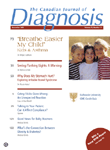 |
November 2002
Feature 1
Why does my stomach hurt so much?
Exploring Irritable Bowel Syndrome
Flavio M. Habal, MD, PhD, FRCPC
Irritable bowel syndrome (IBS) is a global condition affecting up to 20% of the populations. In industrialized countries, the majority of patients seeking medical care for IBS are women.
Feature 2
“Breathe easier my child.” Kids & Asthma
Moyez Ladhani, MD, CCFP, FAAP. FRCPC
The diagnosis of asthma in children is not an easy task. Unfortunately, spirometry in the young child is difficult, therefore the diagnosis is a clinical one.
Case of the Month
Celery sticks gone wrong: An unexpected reaction
Peter Vadas, MD, PhD, FRCPC, FACP
This new department features a case and discussion — tools for your daily practice.
The Den
This department offers thoughtful stories and anecdotes by Canadian general practitioners.
This month: A touching gesture, by George Burden MD
My Diagnostic Triumph
This department highlights diagnostic triumphs that happen every day.
This month: A matter of life and death, by Clément Vézina, MD
Update
Abstracts and news from the medical literature of interest to the primary-care physician.
This month:
Patient-physician communication can improve compliance
Are allergies bad for your mood?
Genes + breast density = cancer?
Antibiotic short therapy likely effective
Surgery better then splinting for severe carpal tunnel syndrome
Hands cleaner with alcohol
Mold sensitivity and severe asthma linked
What’s Your Diagnosis?
Flashing Lights – A Warning Sign
Myrna Lichter, MD, FRCSC
A 55-year-old man presents with a two- to three-day history of flashing lights in the periphery of his vision. He describes the flashes as quick, lasting only a few seconds.
Photo Diagnosis
Illustrated quiz on problems seen in everyday practice (various entries).
ECG Clinic
Review ECGs with specialists from the University of Western Ontario, and the London Health Sciences Centre.
CME Credit Quiz
This test offers the opportunity to assess your knowledge and retention of the information presented in the articles in this issue. This test is prepared with the Dalhousie University CME department.
Medical Briefs
An abridged look at current events in and around the health-care industry.
This month:
- New weapon to battle pneumonia
- New therapy in treating hepatitis C
- Good news for baby boomers’ sex lives
- Hope for erectile dysfunction
- More effective treatment for bipolar disorder
- One quarter of the obese population is diabetic
- Birth control patch approved in Canada
- McGill receives $1, 000, 000 for osteoporosis research
The Best Medicine
Funny medical anecdotes plus a cartoon!
|
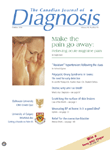 |
October 2002
Feature 1
Make the pain stop: Relieving acute migraine pain
Ralph Kern, MD, FRCPC
Migraines are often under-recognized and under-diagnosed. This article reviews how to assess a migraine headache and what to do about it.
Feature 2
“Resistant” hypertension: Following the clues
Richard Ogilvie, MD, FRCPC, FACP
Physicians need to pay extra attention to patients who are resistant to hypertension medications. This article outlines a few steps to consider.
Women’s Health Care
Polycystic Ovary Syndrome in teens: The need for early detection
What exactly is Polycystic Ovary Syndrome? These authors describe the syndrome and provide tools on how to diagnose and treat PCOS.
Case of the Month
Scratching the surface of skin lesions
Catherine Maari, MD, FRCPC; and Zenovia Hatziris
This new department features a case and discussion — tools for your daily practice.
The Den
This department offers thoughtful stories and anecdotes by Canadian general practitioners.
This month: Out of the Blue, by Kathryn MacFarland, MD
Diagnostic Triumph
This department highlights diagnostic triumphs that happen every day.
This month: More than a grain of salt, by Jeannie Rosenberg, MD
Update
Abstracts and news from the medical literature of interest to the primary-care physician.
This month:
Questioning Home BP Measurement?
Magnesium Can Help Asthmatics
Early Exposure Minimizes Pet Allergies
Protection Against Restenosis
Antipsychotics Risky for Diabetic Schizophrenics
Surprise — No Stiches!
Exercise Improves Fibromyalgia
InforMed.doc
Practical Hints for Busy Physicians
Barrie McCombs, MD, CCFP, FCFP
Medical Information Service (MIS), University of Calgary
Getting a handle on Palm OS
What’s Your Diagnosis?
Doctor, why am I so tired?
Jay Silverberg, MD, FRCPC, FACP
A 28-year-old nurse comes to the office at the insistence of her husband. Her main complaints consist of fatigue, edginess and trouble sleeping.
Photo Diagnosis
Illustrated quiz on problems seen in everyday practice (various entries).
ECG Clinic
Review ECGs with specialists from the University of Western Ontario, and the London Health Sciences Centre.
CME Credit Quiz
This test offers the opportunity to assess your knowledge and retention of the information presented in the articles in this issue. This test is prepared with the Dalhousie University CME department.
Medical Briefs
An abridged look at current events in and around the health-care industry.
This month:
Hope for Stroke Patients
Making Daily Tasks Easier for Arthritis Patients
The Guide for Sexual Dysfunction
Largest Heartburn Trial Shows Relief from Reflux
New Therapy for Benign Prostatic Hyperplasia
New Data Results on Alzheimer’s Disease Therapy
Anniversary for Once-a-Day Bladder Drug!
Drug Heralded to Fight Constipation in Women
The Best Medicine
Funny medical anecdotes plus a cartoon!
|
|
|
|
|
September 2002
Memory Loss:
When is it Alzheimer's?
Chris MacKnight, MD, MSc, FRCPC Kenneth Rockwood, MD, FRCPC
How to assess a patient with Alzheimer's disease? What are the stages of Alzheimer's disease?
Memory Loss:
Information for patients about alzheimer's disease
Information for Patients: 10 Warning Signs of Alzheimer's disease
How to Treat Patients with ADHD?
Alexander K.C. Leung, MBBS, FRCPC, FRCP(UK & Irel), FRCPCH, DCH(Lond & Irel), FRSH, FRAM, FHKCPaed, FHKAM, FAAP Jean-François Lemay, MD, FRCPC
What are the signs of ADHD? How should patients be evaluated and treated?
HRT and Osteoporosis:
What's the controversy? What are the alternatives?
Aliya Khan, MD, FRCPC, FACPE Ahmad Ghany
The Women's Health Initiative raises the question: Is
Hormone Replacement Treatment worth it?
Selecting a Hand-held computer
Barrie McCombs, MD, CCFP, FCFP
Here are a few points to consider if you are planning to purchase one of these handy "personal digital assistants".
Doctor, what's wrong with my tongue?
Wladyslaw Wojcik, MD, FRCPC Jerzy Pawlak, MD, MSc, PhD
A 75-year-old man presented with a history of generalized weakness, fluid retention and weight loss of approximately 50 lbs over the last year. He also noted a change in his voice and an significant enlargement of his tongue.
"The Yellow Fever Plot" Germ warfare during the Civil War
Lawrence Segel, MD
Confederate desperation would lead allegedly one medical practitioner to embark on a campaign of deadly biological warfare.
A Breathless Patient
Keith J.C. Finnie, MB, ChB L.J. Melendez, MD
A 52-year-old women presents with complaints of increasing shortness of breath, reduced energy levels and ankle swelling over the preceding few weeks.
|
|
|
|
|
August 2002
What's that Smell: Olfactory Dysfunction
Steven Sobol, MD, MSc Saul Frenkiel, MD, FRCSC Debbie Mouadeb
Apart from lowering a patient's quality of life, smell disorders may signal an underlying disease.
Patient information, about Olfactory Dysfunction
Saul Frenkiel, MD, FRCSC
Information for your patients on Olfactory Dysfunction
Infliximab in Sarcoidosis
Monique Camerlain, MD, FRCPC
Will infliximab reactivate pulmonary disease if a patient is being treated for sarcoidosis? Is infliximab therapy successful in the treatment of refractory sarcoidosis?
"What's my line?" Linear Lesions in Travellers or Recent Immigrants
Edith Lederman, MD J.S. Keystone, MD, FRCPC
Four case studies highlight unfamiliar lesions and their origins.
Drugs in Cyberspace: Part 2
Barrie McCombs, MD, CCFP, FCFP
A review of Canadian and American medical search engines.
Attacks of Unknown Origin
Stephen Workman, MD, FRCPC
A patient was suffering from narrow complex tachycardia with a rate of 180 beats per minute.
Quiz
An illustrated quiz on problems seen in everyday practice.
"Confessions of an English Opium Eater" Thomas de Quincey's Addiction
Lawrence Segel, MD
The effects of opium on de Quincey and its effects today.
A Narrow Complex
Tachycardia L.J. Melendez, MD Keith J.C. Finnie, MB, ChB
A 79-year-old man underwent coronary bypass surgery.
|
|
|
|
|
July 2002
Genetic Counseling for BRCA 1 and 2
Dawna Gilchrist, MD, FRCPC, FCCMG
Since the BRCA 1 and 2 genes were discovered, physicians have been able to test individuals and families at high risk for breast cancer.
Assessment of Foot Deformities in the Infant
Maureen Baxter, MDCM, FRCS
The first step in examining a child with a foot deformity is to conduct a general neuromuscular assessment.
Women and Reproductive Mental Health
Shaila Misri, MD, FRCPC Xanthoula Kostaras, BSc
It is imperative that GPs have the necessary background for diagnosing and treating mental disorders associated with women and reproductive cycles.
Drugs in Cyberspace: Part 1
Barrie McCombs, MD, CCFP, FCFP
Searches for drug-related information are one of the most common information-seeking tasks for physicians and other health professionals.
Vestigial Remnant, but Not Innocent
Mira Parai, MD, FRCP Joseph F. Wasielewski, MD, FRCP Allan Kirk, MD, FRCP
A 60-year-old man presented with a large swelling of the anterior abdomen.
Quiz
An illustrated quiz on problems seen in everyday practice.
The Stigmata
Lawrence Segel, MD
These strange wounds, which seem to occur without any obvious apparent injury, have been collectively known as the Stigmata - the marks of Christ's suffering.
"To Lyse or Not to Lyse, That is the Question"
Keith J.C. Finnie, MB, ChB L.J. Melendez, MD
A 66-year-old woman presents with a history of severe chest pain which began approximately four hours earlier.
|
|
|
|
|
June 2002
Inherited Disorders Causing Dementia
Grace Yoon, MD Richard Camicioli, MD, FRCPC Dawna Gilchrist, MD, FRCPC, FCCMG
Dementia affects 8% of people over 85 years old and 58% of people over 95 years.
Many conditions, both genetic and acquired, can lead to dementia.
Information for patients about Inherited Disorders Causing Dementia
Dawna Gilchrist, MD, FRCPC, FCCMG
Information for your patients on Inherited Disorders Causing Dementia
West Nile Encephalitis
Gary Victor, MB, FRCPC
West Nile Virus has been known in Africa, the Middle East and in parts of Europe, Russia, India and Indonesia. The introduction of this virus into areas without immunity (like North America) can cause epidemics.
Fostering Culturally Sensitive Practice
Elizabeth J. Latimer, MD, CCFP, FCFP
Culture, ethnicity and religion weave a fabric of each person's particular response to treatment and healing.
Take One Tablet and Call Me in the Morning
Barrie McCombs, MD, CCFP, FCFP
A tablet computer, about the size of a letter-size paper, has a large display screen. Instead of using a keyboard, you would enter information using a hand-writing recognition software!
Not All Chest Pain is Created Equal
Bruno Benzaquen, MD, ABIM
A 47-year-old man with essential hypertension and diet-controlled diabetes mellitus presents with chest pain of two days duration.
Quiz
An illustrated quiz on problems seen in everyday practice.
"Turn On, Tune In, Drop Out!"
The Life of Acid Guru,
Timothy Leary Lawrence Segel, MD
Anyone who lived through the 60s and 70s will have no trouble identifying Timothy Leary.
But who was he?
Tachycardia
L.J. Melendez, MD
Keith J.C. Finnie, MB, ChB
The electrocardiogram was taken on a 62-year-old man two days after an orthopedic procedure for a fractured leg.
|
|
|
|
|
May 2002
Recurrent Abdominal Pain in Children
Alexander K.C. Leung, MBBS, FRCPC, FRCP(UK & Irel), FRCPCH, DCH(Lond & Irel), FRSH, FRAM, FHKCPaed, FHKAM, FAAP Jean-François Lemay, MD, FRCPC Collin Barker, MD, FRCPC, MSc(Epid)
Recurrent abdominal pain is one of the most common and challenging diagnostic and therapeutic problems encountered in general pediatrics.
Recurrent Abdominal Pain in Children
Alexander K.C. Leung, MBBS, FRCPC, FRCP(UK & Irel), FRCPCH, DCH(Lond & Irel), FRSH, FRAM, FHKCPaed, FHKAM, FAAP Jean-François Lemay, MD, FRCPC Collin Barker, MD, FRCPC, MSc(Epid)
Information for your patients on Recurrent Abdominal Pain in Children
Myths about the Obese Patient
Maurice Larocque, MD
Given their concern for people and close contact with their patients, physicians are the health-care professionals best suited to treat obesity.
Andropause: A Man's Menopause
Shafiq Qaadri, MD
A 34-year old male patient had a puzzling constellation of symptoms, which became a lesson is not attributing things to somatization.
Ethical Care: Managing an End-Stage Symptom Control Crisis
Elizabeth J. Latimer, MD, CCFP, FCFP
Symptom control crisis is morally compelling for the patient, family and health-care team.
Links and Personal Toolbar
Barrie McCombs, MD, CCFP, FCFP
The "links" feature in Explorer and the "personal toolbar" in Netscape help you get to your favorite sites fast!
Getting to the Bottom of Pain
Daniel S. Mishkin, MDCM Barry V. Mishkin, MD
A 36-year-old female patient presents with intermittent rectal pain and a sensation of incomplete evacuation over the past eight months.
Quiz
An illustrated quiz on problems seen in everyday practice.
"Banned, Jailed, Burned, but Never Silenced"
Wilhelm Reich, MD Lawrence Segel, MD
Doctor Wilhelm Reich accepted holistic health theory, along with many more provocative ideas.
The "Culprit" Vessel Keith J.C. Finnie, MB, ChB L.J. Melendez, MD A 67-year-old man presents with a one-day history of intermittent anterior chest heaviness and mild shortness of breath.
|
|
|
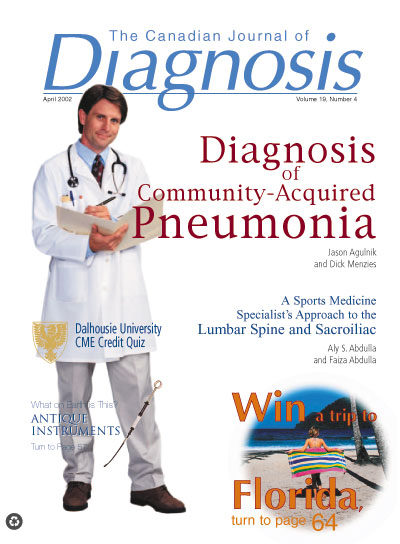 |
April 2002
Diagnosis of Community-Acquired Pneumonia
By Jason Agulnik, MD, CM, FRCPC; and Dick Menzies, MD, FRCPC, MSc
In North America, pneumonia is the sixth leading cause of death and the major cause of death due to infectious diseases. The mortality of CAP is 1% to 5% in the outpatient setting but increases to 12% in hospitalized patients.
Information for patients about the Sports Medicine Specialist’s Approach to the Lumbar Spine and Sacroiliac
By Aly S. Abdulla, BSc, MD, LMCC, CCFP(C), DipSportMed (CASM); and Faiza Abdulla, CDA
This is the fifth in a series of sports medicine articles. The intent of this series is to review musculoskeletal conditions commonly brought to the primary-care physician’s attention, that can be diagnosed and managed easily.
What’s Your Diagnosis?
The Pregnant Patient with Sickle-Cell Disease
By Jason Agulnik, MD, CM, FRCPC
Palliative Care...
In the Acute Care Hospital
By Elizabeth J. Latimer, MD, CCFP, FCFP
The Medicine of History
“Bring Out Your Dead!”
A look back in time at the bubonic plague.
By Lawrence Segel, MD
ECG Clinic
Choosing the correct rhythm strip
By Keith J.C. Finnie, MB, ChB; and L.J. Melendez, MD
|
|
|
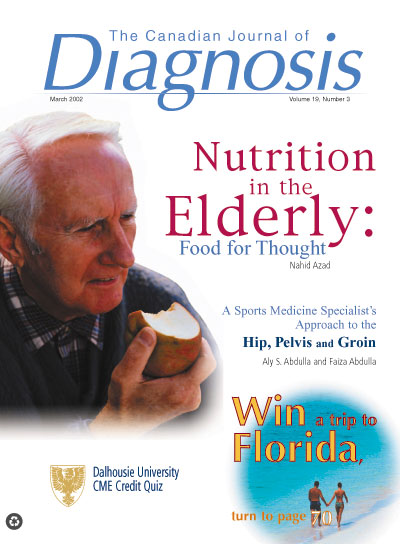 |
March 2002
Nutrition in the Elderly
By Nahid Azad, MD, FRCPC
Screening and assessment for malnutrition are critical in order to institute timely and appropriate nutrition intervention in the elderly. There are a number of tools available today to conduct such screening.
The Sports Medicine Specialist’s Approach to the Hip, Pelvis and Groin
By Aly S. Abdulla, BSc, MD, LMCC, CCFP(C), DipSportMed (CASM); and Faiza Abdulla, CDA
This is the fourth article in a sports medicine series intended to review musculoskeletal conditions that commonly appear to the primary physician’s attention. Dr. Abdulla’s personal approach to history and physical examination is presented to assist in the development of the reader’s own techniques.
What’s Your Diagnosis?
Chest Pain in the ER
By. Eric Horlick, MD, FRCPC
Palliative Care
Mouth Care…Treating the Often Overlooked Symptoms
By Elizabeth J. Latimer, MD, CFP, FCFP
The Medicine of History
Unit 731
By Lawrence Segel, MD
ECG Clinic
Pseudoapoplectic Attacks
By Keith J.C. Finnie, MB, ChB, and
L.J. Melendez, MD
|
|
|
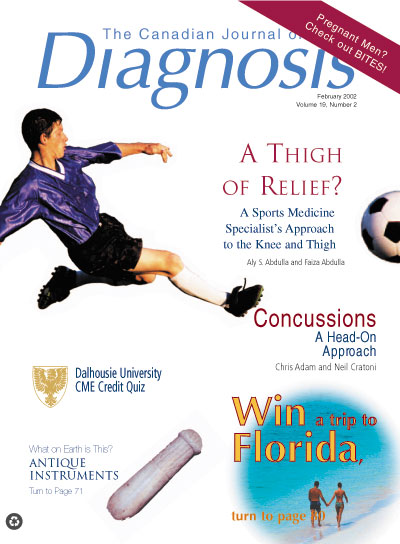 |
February 2002
The Sports Medicine Specialist’s Approach To the Knee and Thigh
By Aly S. Abdulla, BSc, MD, LMCC, CCFP(C), DipSportMed (CASM); and Faiza Abdulla, CDA
When a patient presents with a sports related injury to the knee or thigh, what should you do? This article, the third in a series on sports medicine, can help.
Concussions: A Head-On Approach
By Chris Adam MD, CCFP; and
Neil Craton BSc., MHK, MD, DipSportMed, CIME
Collision sports like football, hockey and soccer provide ample risk of concussion and demand accurate diagnosis and adequate treatment plans from physicians. Outside of the world of sports, most primary-care physicians will see many concussions in their practice. They must be able to react accordingly.
How to Help Your Patients Get Older
By W.B. Dalziel, MD, FRCPC
Getting old is rarely easy, but with help from their physicians, patients can take steps towards healthy aging, thus improving quality of life and reducing health-care costs.
Case Study Pyrexia Of Uncommon Origin
When a patient presented with slight nasal congestion and a fever, the initial diagnosis was viral infection. Later presentations and further investigations, however, revealed a startling cause of the symptoms.
What’s Your Diagnosis?
Chronic Cough
By Jason Agulnik, MD, CM, FRCPC
Palliative Care
“How Best to Treat the Patient…”
By Elizabeth J. Latimer, MD, CCFP, FCFP
The Medicine of History
Horrors of the Healers
By Lawrence Segel, MD
ECG Clinic
Bradycardia
By L.J. Melendez, MD; and Keith J.C. Finnie, MB, ChB
|
|
|
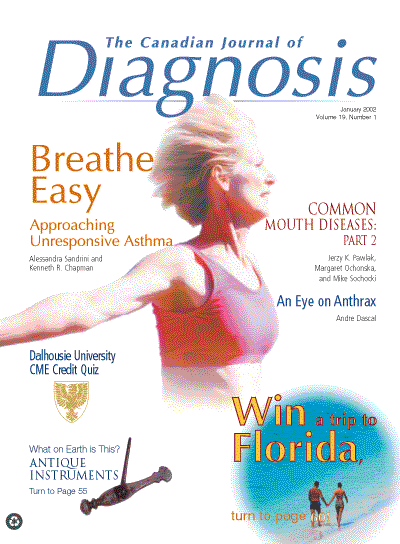 |
January 2002
Breathe Easy
How to Approach Unresponsive Asthma
By Alessandra Sandrini, MD; and
Kenneth R. Chapman, MD, MSc, FRCPC
When challenged by asthma that won’t adequately respond to treatment, what can a physician do? There are a few simple questions one can ask that should help to find a treatment that works.
Common Mouth Diseases: Part 2
The Tongue, Palate and Pharynx
By Jerzy K. Pawlak, MD MSc, PhD;
Margaret Ochonska, MD; and Mike Sochocki, BSc
Typically, mouth diseases have been a neglected component of medical training. A proper mouth inspection is, however, a very important part of a medical examination.
An Eye On Anthrax
By Andre Dascal, FRCPC
Following the recent anthrax attacks in the U.S. many people have had questions about this disease. This article, presented in a question and answer format should help you to answer any concerns your patients may have.
Index
A Guide to Articles From the Year 2001
Trying to find an article we published this year? Looking for more information to help with a challenging diagnosis? Maybe we can help. Why not take a look back at the articles we have published in the last year to find the answers you are looking for?
Palliative Care
“What Shall I Say…?”
Answering the Big Questions In Palliative Care
By Elizabeth J. Latimer, MD, CCFP, FCFP
The Medicine of History
Hormones, Daughters and Death:
The DES Disaster
By Lawrence Segel, MD
|
|